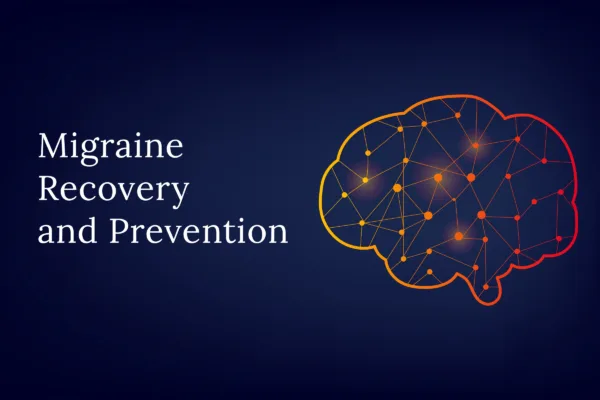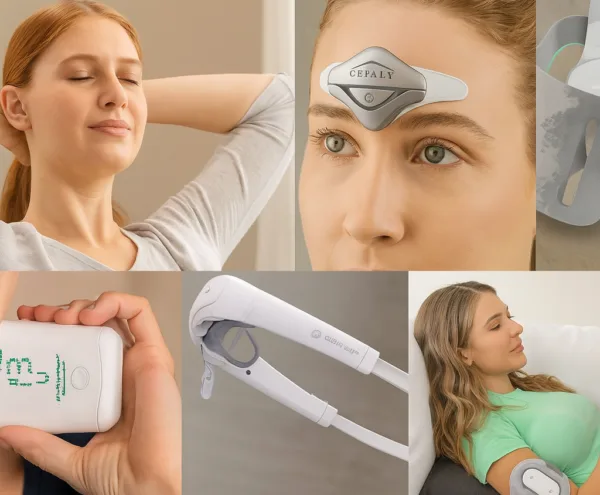Multiple factors can contribute towards headaches. These factors include, but are not limited to, stress, sleep cycle, weather changes, dehydration, and hormonal fluctuations. Hormones play a significant role in women’s health and can be a key factor in understanding and managing headaches.
Recognizing the profound connection between headaches and hormonal imbalances is not only crucial but also empowering. By ensuring this connection is not overlooked and is a central part of your treatment plan, you can feel more in control of your health, knowing that you are addressing all potential factors that may contribute to your condition. It can lead to a more confident approach and potentially improved outcomes.
How Hormones Influence Headaches?
In simple words, hormones are chemical messengers. Their role is to coordinate different functions in the body by carrying messages through the blood to organs, skin, muscles, and other tissues.
In women, the two primary hormones are estrogen and progesterone, which play a key role in headache patterns.
Estrogen:
Estrogen, often associated with sexual and reproductive development in women, also plays a significant role in pain management. It regulates pain sensation in the brain through specific chemicals. A sudden drop in its level due to menstruation can cause a headache or trigger a migraine, a fact that is important to be aware of.
Similarly, progesterone, known for its role in pregnancy and the menstrual cycle, also helps maintain a balance of estrogen. If the level of either hormone drops, it may cause a headache or migraine. Understanding this and taking steps to maintain this balance can make you feel more in control of your health.
Progesterone:
Progesterone, known for its role in pregnancy and the menstrual cycle, also helps maintain a balance of estrogen. Like estrogen, if the level drops, it may cause a headache or migraine. Understanding this and taking steps to maintain this balance can make you feel more in control of your health.
When Do Hormonal Headaches Occur?
Hormonal headaches usually occur during:
Periods (Menstruation):
It is also known as a menstrual migraine, menstrual headache, or period headache. It typically occurs around the time of your menstrual periods. The duration of this headache normally ranges from 4 hours to 72 hours (approximately 3 days). Progesterone and estrogen levels drop sharply during a period headache.
Ovulation:
It is also known as an Ovulation Headache. It occurs before or during ovulation. As your body begins preparing for ovulation, estrogen levels start to rise. As estrogen levels peak, it signals the body to release an egg, which can cause pain or discomfort. This increase in estrogen levels causes headaches or migraine. Another hormone, prostaglandin, also increases the risk of migraine.
Pregnancy:
During pregnancy, estrogen levels increase. Hormonal disturbances mark the first trimester of pregnancy. It is during this time that migraine or headaches are triggered, worsen, or a new episode starts. But as the pregnancy proceeds into the second and third trimesters, estrogen level starts rising and this subsides headache episodes.
Based on this, we can say that during pregnancy, migraines do not occur, but tension headaches can happen. Soon after delivery, headaches might return as estrogen levels drop.
Perimenopause and Menopause:
During perimenopause and menopause, estrogen level fluctuates erratically. It leads to a higher risk of headache or migraine. After menopause, as estrogen level reduces, there is a significant improvement in headaches. But in some women, it might worsen due to hormonal replacement therapy.
Hormone Replacement Therapy:
Hormonal replacement therapies like birth control, patches, vaginal rings and can influence headache patterns. It is because it can cause the hormone levels to rise or fall. On one hand, for some women it might improve headaches, and for some it may worsen. Those women who take pills usually have migraine attacks during the last week when the pills don’t contain hormones.
Oophorectomy:
It is a surgery to remove the ovaries, performed usually alongside a hysterectomy. Ovaries removal causes a sudden drop in estrogen levels, which leads to headaches.
What Are the Symptoms?
Symptoms of a headache caused by a hormonal imbalance may include:
- Aura before the headache (Fewer patients may experience it)
- Throbbing pain on one side of your head
- Increase or loss of appetite
- Sensitivity to light, sound, and smell
- Chills or sweating
- Stomachache
- Blurry vision
- Dizziness
- Less urination
- Cravings for food
What Is the Treatment?
Treatment for hormonal-related headaches depends mainly on how severe they are, how often they occur and other underlying causes. At this point, again, your headache diary is a big saviour. Keeping a record of the intensity and frequency of your headaches, along with any potential triggers or patterns, will help your consultant develop the most effective treatment plan for you. It can also help you track the effectiveness of different treatments over time.
Treatment options may include:
- Doctors can prescribe over-the-counter painkillers or NSAIDs based on the intensity of your headache.
- Hormonal Treatments, such as Birth control pills or hormonal patches, can help reduce headaches. But if you are pregnant, always ask your doctor before taking any medicines.
- Adjusting your lifestyle can also help stabilise your headaches, such as getting regular sleep, exercising regularly, drinking plenty of water, and maintaining a balanced diet.
- Intake of magnesium and vitamin B2 supplements can also help.
- Non-medical therapies, such as neuromodulation devices, acupuncture, and cognitive behavioural therapy, can also be part of the treatment plan.
- Yoga, massage, biofeedback, and ice packs also help reduce headaches.
What Are the Tips for Better Management?
The following tips can help you manage your headaches:
- Follow a consistent sleep cycle
- 30 minutes of regular exercise at least three times a week
- Good hydration means drinking plenty of water.
- Eating a balanced diet at the proper time and not skipping meals
- Eating a balanced diet at the proper time and not skipping meals
- Maintain your headache diary
- Manage your stress
When Should I Visit a Doctor?
A mild headache may go away and doesn’t require urgent attention. However, if you experience frequent, painful headaches that prevent you from carrying out your daily routine, consult a doctor.
At the Headache, Migraine & Concussion Centre, we offer expert consultation with accurate diagnosis. Not only this, but we also provide non-medicine treatment all under one roof, like Botox for migraine, Nerve Block Injections and acupuncture
References
https://www.webmd.com/migraines-headaches/hormones-headaches
https://www.mayoclinic.org/diseases-conditions/chronic-daily-headaches/in- depth/headaches/art-20046729
https://my.clevelandclinic.org/health/diseases/8260-menstrual-migraines-hormone-headaches
https://www.healthline.com/health/hormonal-headaches#causes
https://www.healthline.com/health/womens-health/ovulation-headache#causes


















